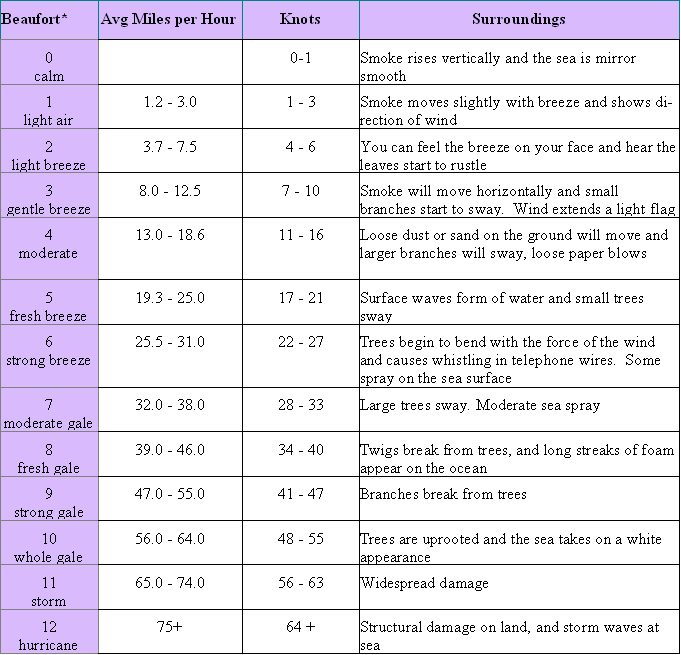Beaufort Scale
| Beaufort | 1-min Wind speed | Effects on land |
| 0 Calm |
0 - 1 mph | Calm. Smoke rises vertically. |
| 1 Light air |
1 - 3 mph | Smoke drift indicates wind direction and wind vanes cease moving. |
| 2 Light breeze |
3 - 7 mph | Wind felt on exposed skin. Leaves rustle and wind vanes begin to move. |
| 3 Gentle breeze |
7 - 12 mph | Leaves and small twigs constantly moving, light flags extended. |
| 4 Moderate breeze |
12 - 17 mph | Dust and loose paper raised. Small branches begin to move. |
| 5 Fresh breeze |
17 - 24 mph | Branches of a moderate size move. Small trees in leaf begin to sway. |
| 6 Strong breeze |
24 - 30 mph | Large branches in motion. Whistling heard in overhead wires. Umbrella use becomes difficult. Empty plastic bins tip over. |
| 7 Near gale |
30 - 38 mph | Whole trees in motion. Effort needed to walk against the wind. |
| 8 Gale |
38 - 46 mph | Some twigs broken from trees. Cars veer on road. Progress on foot is seriously impeded. |
| 9 Severe gale |
46 - 54 mph | Some branches break off trees, and some small trees blow over. Construction/temporary signs and barricades blow over. |
| 10 Storm |
54 - 63 mph | Trees are broken off or uprooted, saplings bent and deformed. Poorly attached asphalt shingles and shingles in poor condition peel off roofs. |
| 11 Violent storm |
63 - 73 mph | Widespread damage to vegetation. Many roofing surfaces are damaged; asphalt tiles that have curled up and/or fractured due to age may break away completely. |
| 12 Hurricane |
73 - 99 mph | Very widespread damage to vegetation. Some windows may break; mobile homes and poorly constructed sheds and barns are damaged. Debris may be hurled about. |
Alternative, courtesy of NOAA

|
